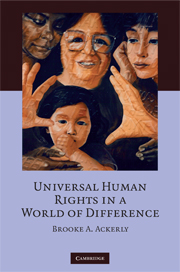Book contents
- Frontmatter
- Contents
- Acknowledgments
- 1 Universal human rights in a world of difference: challenging our thinking
- Part I Epistemology, diversity, and disagreement in theory and practice
- Part II A methodology for immanent theory
- Part III Immanent universal human rights: theory and practice
- 7 An immanent and universal theory of human rights
- 8 Terrain(s) of difficulty: obligation, problem-solving, and trust
- 9 Feminist strategies
- 10 “If I can make a circle”
- Bibliography
- Interviews
- Index
8 - Terrain(s) of difficulty: obligation, problem-solving, and trust
Published online by Cambridge University Press: 06 July 2010
- Frontmatter
- Contents
- Acknowledgments
- 1 Universal human rights in a world of difference: challenging our thinking
- Part I Epistemology, diversity, and disagreement in theory and practice
- Part II A methodology for immanent theory
- Part III Immanent universal human rights: theory and practice
- 7 An immanent and universal theory of human rights
- 8 Terrain(s) of difficulty: obligation, problem-solving, and trust
- 9 Feminist strategies
- 10 “If I can make a circle”
- Bibliography
- Interviews
- Index
Summary
Preface
What is in a name? In my discussion of Jean-Paul, Marie, and their family, I have changed their names and some facts for their privacy and safety. Despite this care, until their third country resettlement status was approved by UNHCR, I worried that by telling bits of their story I would introduce a full range of insecurities into their situation. The more I learn about Rwanda, the more it seems that their unbelievable story is, while perhaps unique in its particulars, not unique in the details that I have shared with you. Less than a month after this status was finalized, many registered Rwandan refugees in Uganda were repatriated to Rwanda.
Funny, but when I use these aliases and these altered details, I have trouble picturing them. When I call him “Jean-Paul” I cannot picture him coming to life when introduced to other francophone expatriates in India. When I call her “Marie” I cannot picture her newly married and thin from rural farm work or making a traditional dress from the cloth Jean-Paul brought her from India.
My memories of Jean-Paul are more vivid, not when I reread my own distorted account of their lives, but when I serve green beans for a crowd in the casserole dish he gave me as a “thank you” for hosting him and translating for him during his stay in Bangladesh. With a cook as his guide and no common language but cooking and hospitality between them, he had gone all over a certain district of Ahmedabad looking for a serving dish appropriate for hosting a crowd. He said such a casserole dish was a traditional Rwandan housewarming present.
- Type
- Chapter
- Information
- Universal Human Rights in a World of Difference , pp. 232 - 270Publisher: Cambridge University PressPrint publication year: 2008



